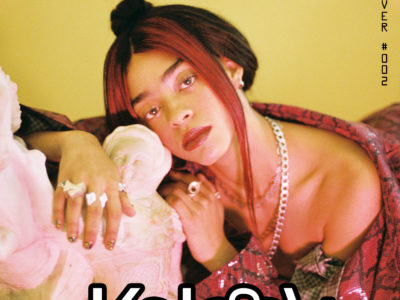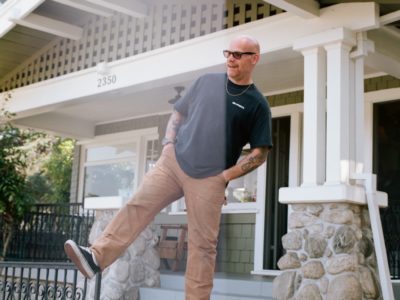Sean Baker, Filmmaker

Feature
In a billion dollar industry, Sean Baker is the rare filmmaker who is driven by his ingenuity and passion for movies that depict the stories of America’s most overlooked residents. Finally, six films later, Sean is getting the recognition that he so deserves for his latest film, The Florida Project.
On The Florida Project's Subtle Power
WORDS BY: ARIELA KOZIN
There’s no explosions or CGI in The Florida Project, but there is The Magic Castle. The motel unofficially acts as a low income housing unit in Central Florida for $30 per week. Like the rest of the city, the unit lives in the shadow of the town’s tourists headed to Disney World. Of the many dwellers, Sean focuses on hustling single mom Halley and her equally unruly 6-year-old daughter, Moonee. We see them over the course of one sweltering summer, getting into trouble apart and exemplifying the unconditional, complex bond between mother and daughter.
What is perhaps most magical about the Magic Castle Motel is not it’s fresh coat of lavender paint and it’s certainly not its on-site attractions. It’s the people that preside there. Despite their dim circumstances, having nowhere else to go, Sean portrays the joy in between the hopelessness. He reveals the bonds between friends and family. The children who don’t need iPads for entertainment, but who giggle over a shared ice cream scoop, an abandoned house, or a rainbow. And then their is Bobby (Willem DaFoe), the no-nonsense but caring manager who acts as surrogate father to his customers, protecting them from the cruelties from off the property. Sean and his cast and crew remind us that the person who is begging on the street, or working the pole, or pulling a late night shift at the drive-thru is in fact a person like the rest of us.
The journey viewers go on with the pair is all together tearful, hilarious, thrilling, haunting, and truly one-of-a-kind.
Sean Baker, The Anomaly
WORDS BY: ARIELA KOZIN
When we met Sean Baker at the Four Seasons Hotel on cushioned pillows surrounded by artisanal treats, he didn’t seem all that comfortable. In our first moments together, it’s easy to tell that this creator is by no means interested in how many stars his accommodations have–after all, he is the man who defied industry standards by proving you can indeed make an acclaimed film with an iPhone. He is gentle and thoughtful with his articulations about his craft and grateful despite the awards season buzz swirling around his new movie.
We had to wonder, “How does a man like this — so different from his peers succeed?” The answer is a combination of kindness, perseverance, fearlessness, and an unwillingness to compromise. Read our conversation below to learn more:
We didn’t feel as though Tangerine received what it deserved in terms of accolades, but it seems as though your work is really exploding right now, like you’re getting the recognition you were snubbed.
The cool thing is that Tangerine is still making an impact. Just yesterday, I got this wonderful message that really made my day. It was from a trans woman and film critic who said something like, ““I’m glad that this is the first film that has had an impact that I feel properly represents it.” When I see stuff like this, I see that what I’ve done has made an impact. But I get a lot of young filmmakers coming my way and saying, “I’m inspired to make films now” because of it, and it makes me feel so good because that’s the position I was actually in when I was trying to get attention and break out fifteen years ago.
I was worried about moving into this film in a way because I was sort of abandoning some of the stuff that made people excited about Tangerine, but what I think the ultimate message is if you have the means to make your film, you do it. People are picking up on that and they really appreciate it.

Does it feel different this time, now that you’ve been picked up by A24 and you are getting all of these accolades so early on?
I guess so. It’s been a long road. This is my sixth film, and each one has had its champions and its accolades, but this one definitely is a whole other level. I don’t know how to actually analyze that, as to why this one, I don’t know. I don’t even know if this film is my best film, but I feel like it’s probably just the fact that now I have a body of work that people are looking at, and I feel like the culmination is somehow adding up to this.
Our guess is that just a year ago it was a lot easier for people to ignore the injustices of those in low-income housing and struggle for trans-rights and the like. Now, our current administration forces us to stare straight at those issues.
We’re living in a time where audiences, critics, journalists are looking for political content because of the fact that we’re living in troubled times, and they’re looking for entertainment media to address some of these issues. Maybe that’s part of the reason. Because I’ve been making these sort of films for fifteen years, Takeout was about an undocumented Chinese worker paying off a debt, Prince of Broadway was about an African immigrant selling counterfeit goods and having to deal with his status. I’ve been doing this, but I think it’s reached a time in 2017 where people are “woke.” I hate that fucking word, but that’s what I see on Twitter all day. Thank God that there is a generation who is actually interested in these stories being told.

Why are you so attracted to the underbelly of America?
No matter where you are in the world, the “common people” make up the society, and it’s been brought to my attention. Now that I’ve reached my sixth film, I look at my body of work and can see the through line that critics and journalists are focusing on. There seems to be a focus on marginalized people and communities, and it’s not such a calculated thing. I think it’s just my response to what I’m not seeing in film and television, especially in US cinema. I mean, there’s always been Ken Loach and filmmakers all over the world who have attempted this for a hundred years, but lately I haven’t seen it as much in US cinema.
The more that stories are told about marginalized subcultures, communities, minorities, the less marginalized they will be, just by simply having quality of storytelling. So I think that that’s my goal, that’s my desire in the message with these films. It’s to tell universal stories that happen to take place in a specific subculture, however you want to put it, so that it helps remove some of the stereotypes or stigmas that might be applied to that. And so that ultimately people see that there’s a universality to everybody.
The more that stories are told about marginalized subcultures, communities, minorities, the less marginalized they will be, just by simply having quality of storytelling.
And hidden homeless population is an epidemic in America right now.
I didn’t even know about the issue of the hidden homeless. I knew, of course, about the homeless. I’ve lived in New York and I’ve lived in LA and both with issues, but I didn’t understand that there were basically individuals or families with children holding onto a roof over their heads one step away from the streets. They’re in the same situation, they’re just doing what everybody can do to keep a roof over their child’s head.

These complex character feel so intimate, almost like a memoir. How did you go through developing a character like Hailley and unwrapping her complexities to create so many layers?
Well, we did our research. I think, along the way, when we were interviewing a lot of residents, we found the real Halleys–the single mothers with absolutely no support system or safety net and having to do whatever they have to do. And there were common traits, usually young, usually without any sort of formal education, and then of course being set in 2017, there are certain interests, what music she would be listening to and the pop culture she would be attracted to. It was really just about, at that point, making her real.
And then I found Bria, even though she is in no way the Halley character, I think there are parallels like that she came over to the US from Lithuania and grew up in a single parent family with only her mother raising her. There are certain parallels that she was able to identify with and therefore help us all flesh out that character. And she came down a month early, she was greener than Brooklyn [who played Moonee, her daughter], but she was very enthusiastic. She took this opportunity very seriously. So she worked along with myself and Samantha Quan, who was the acting coach for the children, but she took Bria under her wing and we just worked through these scenes. And she memorized all of the written lines, but they were memorized so well that they became more about themes than actual lines. So when we actually get into the moment, sometimes I would encourage improvisation. I’m so proud of her, she really kicked ass.

Just talking to you now, you can hear the emotion in your voice. It’s obvious that you really love this project and your body of work.
This is how I see it: A movie takes realistically about three years. It’s two years of prepping and producing, and then another year of just seeing it out into the world. This is just the beginning. I’m sure I’m going to have to do the festival circuit and sell the film for the next eight months. I’m not going to spend three years of my life on something that is meaningless to me. As I grow older, I feel like if I’m going to put my time and energy into this, and have the great privilege of having this platform, then I should be doing something that helps not only myself, but perhaps makes the world a little bit nicer and gentler, and helps shed a light on certain issues that don’t have a light on them.
As I grow older, I feel like if I’m going to put my time and energy into this, and have the great privilege of having this platform, then I should be doing something that helps not only myself, but perhaps makes the world a little bit nicer and gentler.
What would you tell someone who aspires to be the next Sean Baker?
Well, because this is this industry, this art form is half art half commerce, so you need to do whatever you can do to get. If you’re just going into school, consider a minor in business. We’ve reached the point where we actually can do things on our own. We have the technology to produce things on our own that reaches the quality level of the studios, but also distribution laws are changing. You can actually make your little independent film company into a studio if you want, and so why not take advantage of that?
Learn the business. Understand the business, and also don’t wait. That’s my biggest thing–don’t wait. If I waited, I would never have made a film. I have friends who told me they want to make a film, but they aren’t going to make it until they get the twenty-five million dollars needed to make it. Well guess what? They’re 50 years old, and they still haven’t made their first feature. I’ve now had six, and now that has finally paid off. Nobody just gives you money, you have to prove yourself. And unfortunately–this is the part that sucks–you have to prove yourself again and again and again, and every time, it’s like making your first. It really is and, believe it or not, that never ends.






